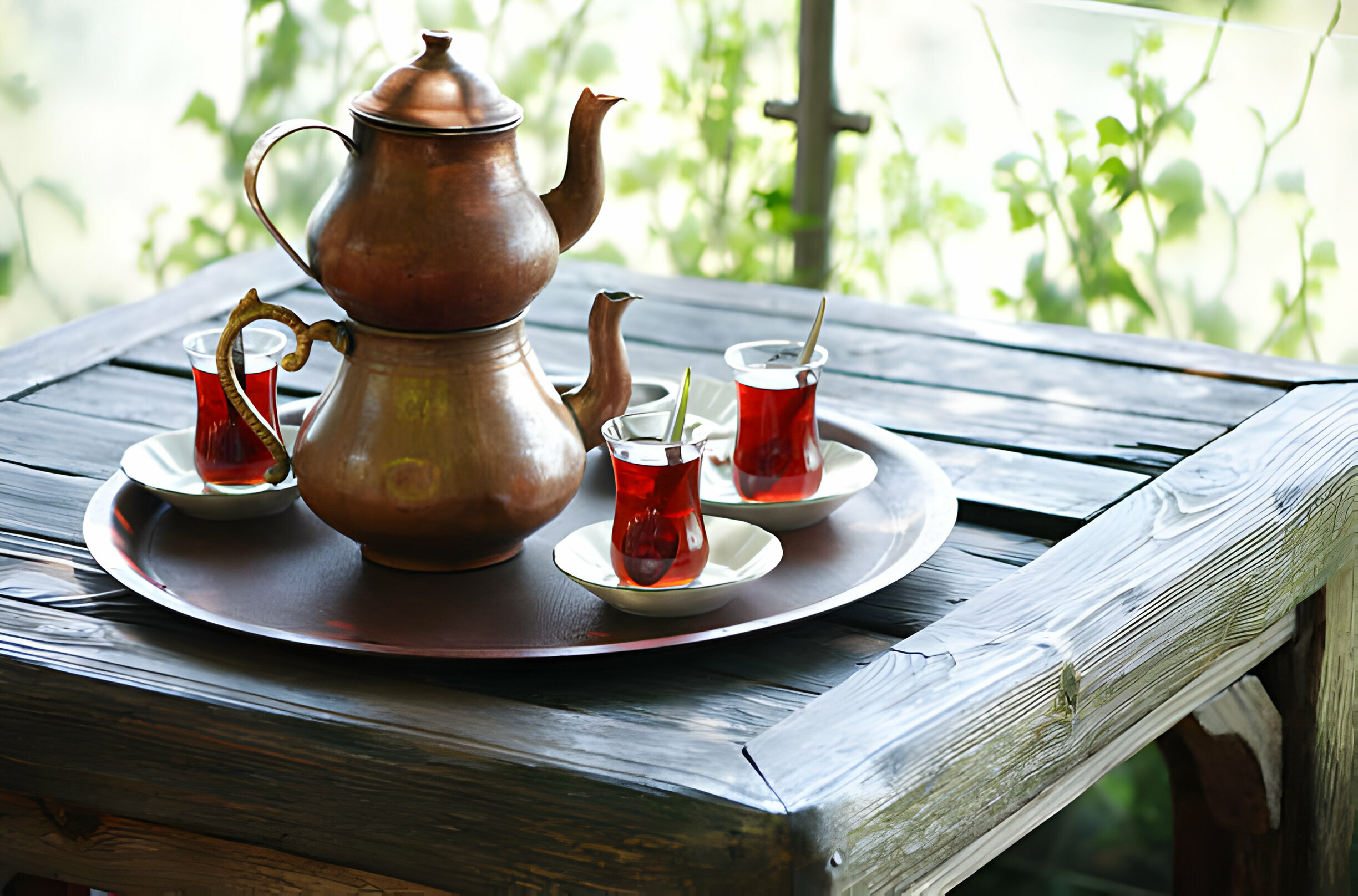Turkish Tea Culture: The Favorite Drink of Turks
The Favorite Drink of Turks Turkish tea is an integral part of Turkish cuisine culture, and it is a drink that is present in all places in Turkey. At first glance, when you visit Turkey, you might think that coffee is the favorite drink of the Turks, but quite the contrary, Turks drink Turkish tea in the morning, evening, during work hours, and at all times and in all places. What is the connection between Turkish tea and Turkish culture? What sets it apart from other types of tea? And what are its benefits? This is what we will explore in the following article, so stay with us.
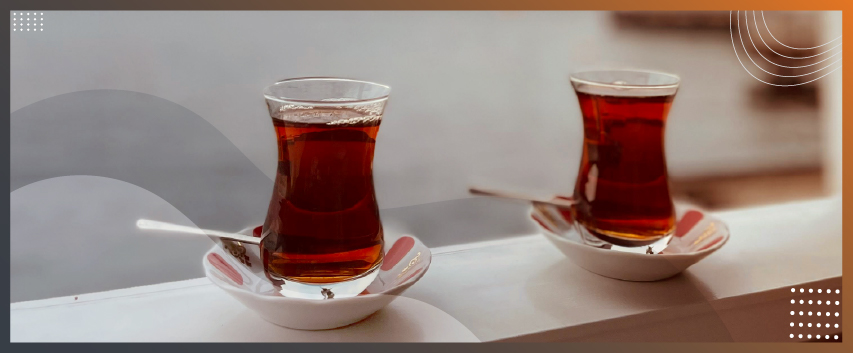
How is Turkish Tea Prepared? Authentic Turkish tea is not making in a regular kettle by simply boiling water and adding tea leaves, but there is a distinctive way to making it. A special pot called a "çaydanlık" is used to making tea in Turkey, with the lower half being larger than the upper half. The secret to making Turkish tea lies in steaming the leaves rather than boiling them within the water. Equipment and Ingredients:
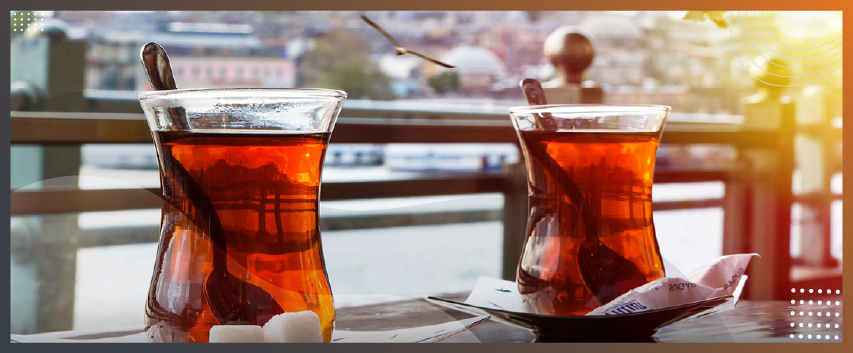
- A "çaydanlık" pot specifically for tea in Turkey.
- Fresh and pure tea leaves.
- Water.
- Sugar.
- Special glass cups within Turkish cuisine.
The preparation steps are as follows:
- Fill the lower half of the "çaydanlık" pot and leave it on the heat until the water boiling.
- Add more water with two tablespoons of tea leaves to the upper part of the pot.
- Place the pot back on the heat but at a low temperature, allowing the tea leaves to steam and ferment.
- Turkish tea will be ready after about fifteen minutes.
- You can add Sugar if you want. Tea in Turkish Culture Tea is an integral part of Turkish culture, being the most delicious drink in Turkish cuisine and restaurants. Tea in Turkey is the most popular drink among Turks, with most of them drinking tea from morning until late at night. Whether at home or work, in cafes during gatherings with friends, or in public parks, tea is the Turks' first companion. According to statistics, nine out of ten Turks drink tea daily, with each person consuming approximately 3-4 cups a day, which amounts to around 1300 cups of Turkish tea per year. Tea is also considered the primary hospitality drink.
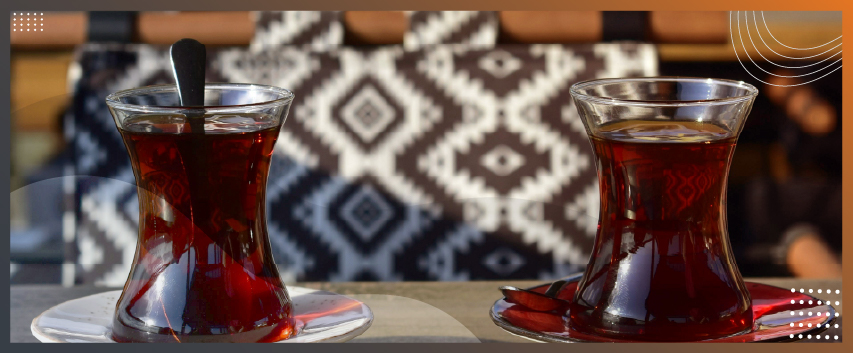

If you visit a friend's house in Turkey, the first thing they will offer you is a cup of tea. Once you finish your cup, your friend will give you more, always ensuring you have another cup. If you are done, place a sugar spoon horizontally on the cup, signifying satisfaction, satiation, and gratitude for the hospitality. Times for Drinking Turkish Tea All times are suitable for drinking tea in Turkey.
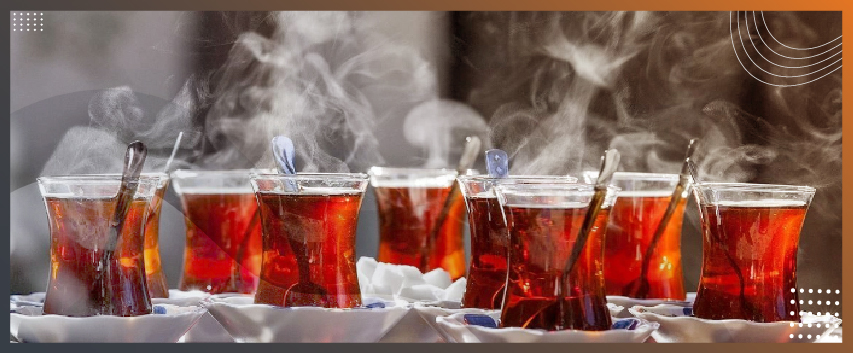

When waking up, you will first ask, "Is the tea ready?" and before sleeping, you will say, "I'll prepare a cup to help me sleep." Tea is consumed in Turkey at the following times:
- Tea is enjoyed in the morning with breakfast.
- Workers and employees drink Turkish tea throughout their workday.
- Turks men enjoy tea in cafes while playing card games.
- Women gather daily after noon to drink tea and talk about their day.
- Children have tea mixed with milk for breakfast daily.
- Turks and tourists relax while strolling in beautiful historical sites in Turkey at nearby restaurants to drink Turkish tea. Tea Plantations in Turkey Turkey ranks as the fifth largest tea-producing country globally, producing approximately 22 thousand tons per year. It follows China, India, Kenya, and Sri Lanka in production volume. On the other hand, Turkey is the largest consumer of tea without competition, with an average consumption rate of about 24 thousand tons of Turkish tea.
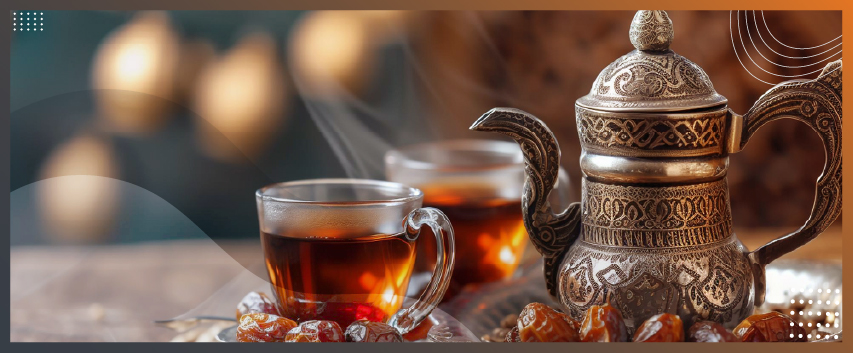
But where does Turkey source these large quantities of tea from? The climate in Turkey is suitable for the growth of tea plants, especially in the Black Sea region. The first attempt at cultivation was in the early 20th century, and after its success, the areas allocated for tea cultivation expanded to over 850 thousand acres on the slopes of mountains overlooking the Black Sea. Turkish tea plantations appear orderly and coordinated, resembling green terraced fields that captivate hearts. If they look beautiful, how do they taste? The provinces of Trabzon, Giresun, Rize, and Artvin are among the most famous provinces where tea is cultivated in Turkey.
Tea is one of the most important products exported by the Turkish government, being exported to over 100 countries. The value of tea exports has exceeded $25 million, making the cultivation of this delicious drink an important factor in the strength of the Turkish economy. Health Benefits of Turkish Tea The tea not only offers pleasure in tasting but also includes a range of health benefits and improves overall body condition. Let's explore the most important health benefits of Turkish tea, provided it is consumed without sugar or milk: Boosting the immune system Turkish tea has antioxidant properties that help kill germs and prevent chronic and acute diseases. Weight loss The antioxidant properties of tea help speed up metabolism, making green tea drink linked to weight loss. Reducing harmful cholesterol levels in the blood Drinking tea without sugar helps reduce harmful cholesterol levels in the blood. Preventing high blood pressure:
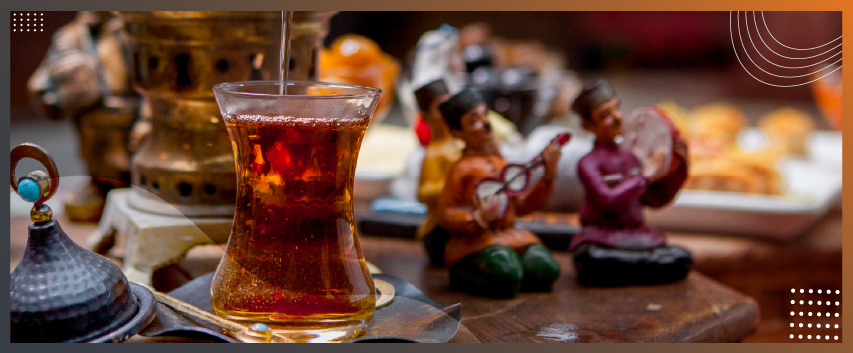
Drinking Turkish tea helps lower blood pressure and prevent hypertension. preventing heart diseases Turkish tea contributes to protecting the heart and maintaining its health due to the presence of flavonoids in the plant. Additionally, the role of tea in lowering blood pressure and reducing cholesterol levels positively affects heart health. Cancer prevention Tea contains substances that combat cancer cells, along with its antioxidant properties that help prevent certain types of tumors.
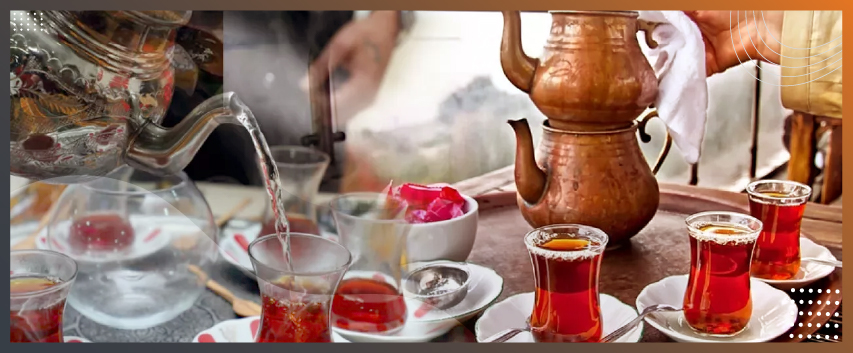
Tips for preparing the perfect tea in Turkey If you want to prepare the best Turkish tea, follow these tips:
1) Type of leaves: Make sure to choose high-quality tea leaves grown in pollution-free areas and preserved in sealed bags after picking.
2) Before adding tea: Wait a little until the water stops boiling before adding the tea to the upper half of the pot.
3) After adding tea: Ensure making Turkish tea over low heat for a short period, avoiding strong heat or boiling for more than a quarter of an hour.
During boiling: Avoid stirring the tea leaves in the pot as it will make the drink bitter. Does Turkish Tea Differ from English Tea? English tea is similar to Turkish tea in terms of leaf type and steaming method. However, there are some differences that make tea in Turkey special:

- Steeping method: Turkish tea is making using a double pot called "çaydanlık," while English tea is making using a regular teapot.
- Additions: Tea in Turkey only has sugar or mint added, while English tea can have milk or lemon added.
- Tea cups: tea in Turkey cups are glass without handles and have a tulip shape, while English tea cups are made of porcelain with handles. The best types and brands of Turkish tea After we mentioned the Tea benefits, the method of its making and its relationship with Turkish culture,
it's time to get acquainted with the best types of tea in Turkey:
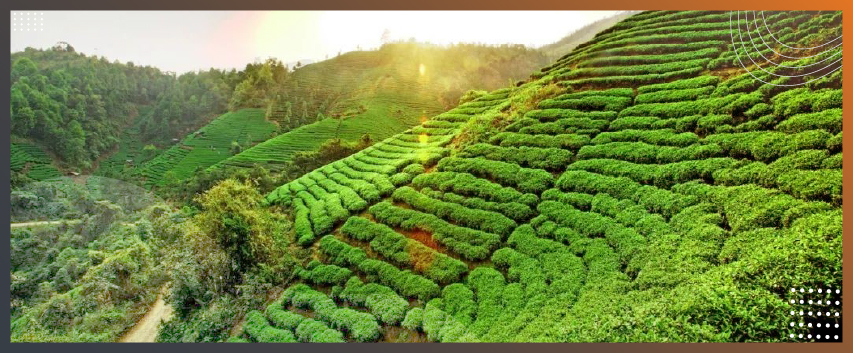
Dogus tea One of the best brands of Turkish tea is characterized by competitive prices, multiple flavors, small, medium and large sizes. Dogadan tea The most famous brand in Turkey and almost no Turkish house is without this delicious tea, from which there are leaves or powder with special slimming products.
Turkish tea Beta tea Of the modern tea brands in Turkey that have proven their preference and quality, it is a must to try them at least once in your life. Tea Chado The Chadu brand includes many flavors of more than 50 flavors of tea, and it is the brand with the tastiest taste, and you should try it despite its high prices compared to other types of Turkish tea.
